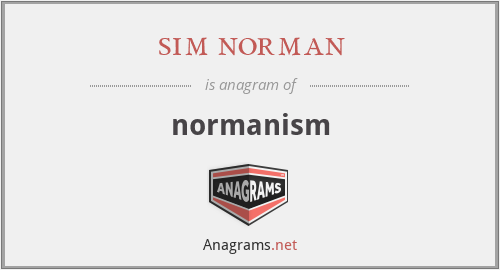What anagrams are available for normanism?
This page is about an anagram for the word sim norman that can be used in word games, puzzles, trivia and other crossword based board games.
sim norman
Translation
Find a translation for sim norman in other languages:
Select another language:
- - Select -
- 简体中文 (Chinese - Simplified)
- 繁體中文 (Chinese - Traditional)
- Español (Spanish)
- Esperanto (Esperanto)
- 日本語 (Japanese)
- Português (Portuguese)
- Deutsch (German)
- العربية (Arabic)
- Français (French)
- Русский (Russian)
- ಕನ್ನಡ (Kannada)
- 한국어 (Korean)
- עברית (Hebrew)
- Gaeilge (Irish)
- Українська (Ukrainian)
- اردو (Urdu)
- Magyar (Hungarian)
- मानक हिन्दी (Hindi)
- Indonesia (Indonesian)
- Italiano (Italian)
- தமிழ் (Tamil)
- Türkçe (Turkish)
- తెలుగు (Telugu)
- ภาษาไทย (Thai)
- Tiếng Việt (Vietnamese)
- Čeština (Czech)
- Polski (Polish)
- Bahasa Indonesia (Indonesian)
- Românește (Romanian)
- Nederlands (Dutch)
- Ελληνικά (Greek)
- Latinum (Latin)
- Svenska (Swedish)
- Dansk (Danish)
- Suomi (Finnish)
- فارسی (Persian)
- ייִדיש (Yiddish)
- հայերեն (Armenian)
- Norsk (Norwegian)
- English (English)
Definition
What does normanism mean?
- normanism
- Anti-Normanism is a movement of historical revisionism in opposition to the mainstream narrative of the Viking Age in Eastern Europe, and concerns the origin of Russia, Ukraine, Belarus and their historic predecessor, Kievan Rus'. At the centre of the disagreement is the Rus' people, a people generally considered to be of Scandinavian origin and who arrived in Eastern Europe in the 8th and 9th centuries, but who during the 10th and 11th centuries merged with Fenno-Ugrics, Balts and East Slavs, and together with them formed Kievan Rus' with Old East Slavic as a common language, and with the name Rus' as a common marker of identity. The origin of Kievan Rus' is infamously contentious, and relates to its perceived importance for the legitimation of nation-building, imperialism, and independence movements within the Slavic-speaking world, and for legitimating different political relationships between eastern and western European countries. The Norsemen that ventured into the waterways of Eastern Europe feature prominently in the history of the Baltic states, Scandinavia, Poland, and the Byzantine Empire. They are particularly important in the historiography and cultural history of Russia, Belarus, and Ukraine but have also featured in the history of Poland. Nevertheless, contention has centred around whether the development of Kievan Rus' was influenced by non-Slavic, Viking migrants (this idea is characterised as the 'Normanist theory'), or whether the people of Kievan Rus' emerged solely from autochthonous Slavic political development (known as the 'anti-Normanist theory'). Added to this ideological force is a scarcity of contemporary evidence for the emergence of Kievan Rus', and the great ethnic diversity and complexity of the wide area where these Norsemen were active.
Embed
Citation
Use the citation below to add this anagram to your bibliography:
Style:MLAChicagoAPA
"sim norman." Anagrams.net. STANDS4 LLC, 2024. Web. 16 May 2024. <https://www.anagrams.net/term/9071147>.



Discuss this normanism anagram with the community:
Report Comment
We're doing our best to make sure our content is useful, accurate and safe.
If by any chance you spot an inappropriate comment while navigating through our website please use this form to let us know, and we'll take care of it shortly.
Attachment
You need to be logged in to favorite.
Log In